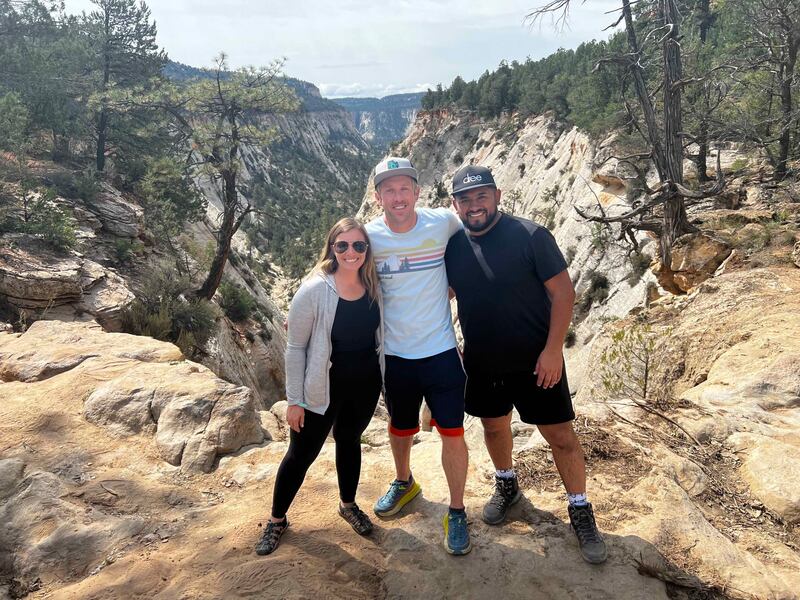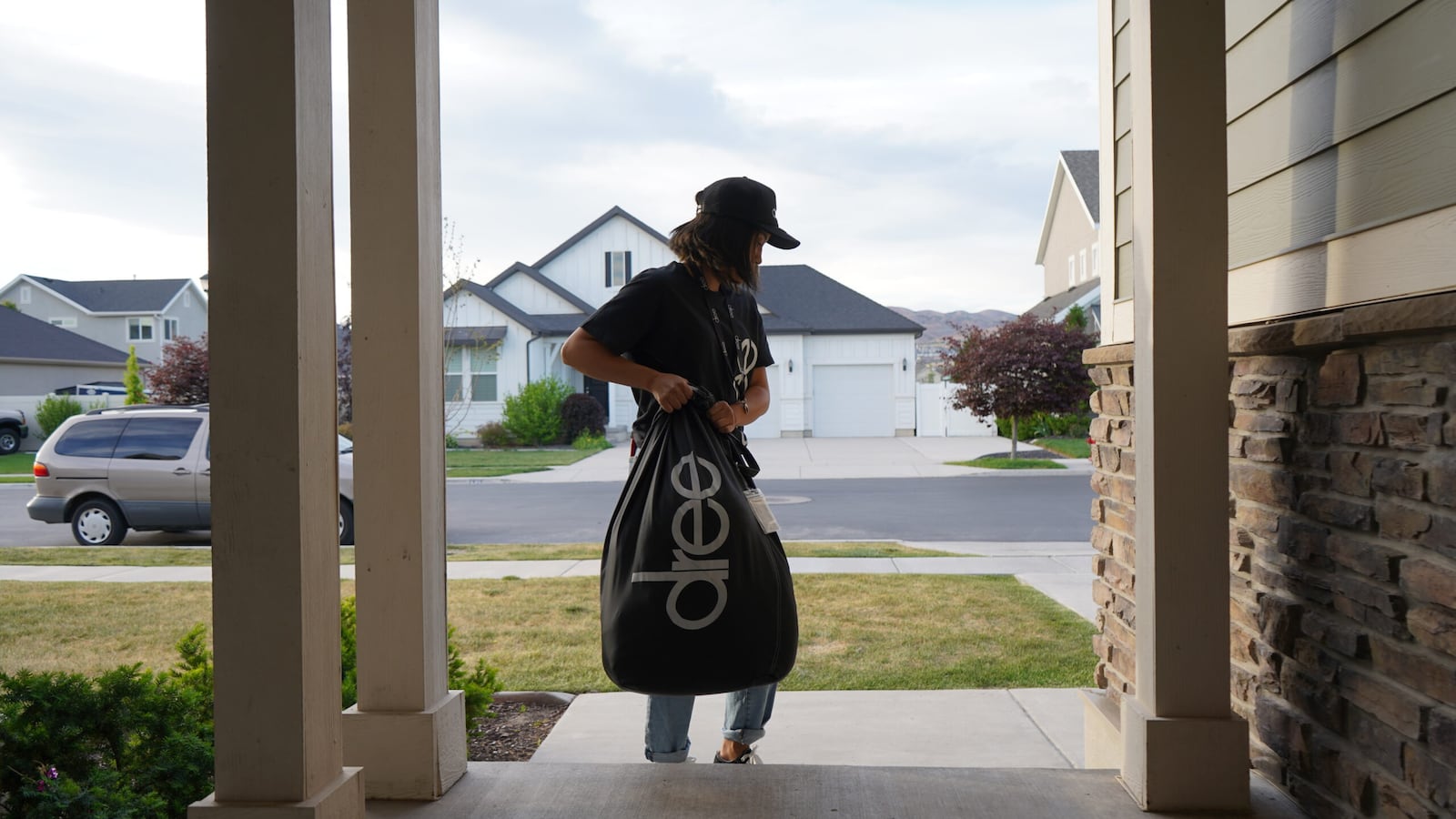For a long time, I tried to have people see me as an equal. During my elementary and high school years, I was bullied for being an immigrant. I’d be walking through the field by myself and I’d get beat up, or I’d be sitting at my desk and someone would come by and spit on me. You’d think this stuff only happens on television, but this was real life for me.
One day in social studies, a kid raised his hand. As he was looking at me and talking to the teacher, he asked, “Miss Ellis, if we know of any illegal immigrants in our classroom, are we allowed to call Border Patrol and have them deported?” The teacher responded, “Yes, of course, that’s your right, and being here illegally is not right.” A memory forever ingrained in my head.
Fast-forward to my late teens, I joined The Church of Jesus Christ of Latter-day Saints and got the bug to serve a mission. My legal status wasn’t formalized, but my family was in line for residence, and I was a part of the package.
I said to my bishop, “I have a situation; I don’t have legal status.” My bishop said, “The only way for you to serve a mission is to go to your home country.” My parents thought it was foolish of me to go because if I left, I’d be out of their immigration package. We spoke to an immigration attorney, and he said, “If you leave, you’ll have a ten-year penalty where you won’t be able to apply for a visa, nor will you be able to come into the US.”
I ended up going on a mission anyway and returned to Mexico. I was there for about five months, filled out my paperwork, and got called to serve in Denver, Colorado. I was able to return to the US on an R1 (Non-Immigrant Religious Workers) visa.
Buying a deli and turning it into a Mexican restaurant
I finished my mission and flew back to Seattle, where my parents were living—overstaying my visa. I figured since I didn’t have any education beyond high school, I probably wouldn’t be able to get a decent job. The only thing I’d seen my parents do was jump into something new with no fear of failing. In 2006, I walked into a deli and said to the owner, “Hey, I’d love to buy your deli.” I didn’t have any money, but I had experience in the food industry. He said, “Alright, I’m going to finance you, and you’re going to pay me $30,000. This is perfect timing because I just bought a hotel in a different town, and I’m splitting time between this deli and the hotel.”
I turned that deli into a fast-food Mexican restaurant, and within six or eight months, I sold it. It was the start of my journey of proving all the bullies wrong and showing them and myself that I was capable of achieving great things. I kept repeating the cycle. At the start, I had no experience running a business—zero. I had no idea what I was doing, but it felt really good. I decided I was a restaurateur and went on to open multiple locations over a few years, then successfully sold all of them. Along the way, I opened a company that imported coffee from Mexico, roasted it in Seattle, and distributed it along the West Coast.
The restaurants received awards such as “Seattle’s Top 10 Best Mexican Restaurants" and were featured in Sunset Magazine, but all of this was because I was always trying to prove myself. When I chose the concept for the Mexican restaurants, I did it so I could say, “This is who I am.” Even when I started my coffee company, I maintained this theme—got the coffee from southern Mexico, packaged it nicely, and represented it well: “this is who I am.” I’ve trumped all of the doubters and ghosts from my past.
By this time, I was married and had just had my second child. One night, I was driving home and I suddenly started crying uncontrollably in the car. I graduated from high school in 2001, and it was now 2017, a long time later. I was replaying all the things that happened to me in school.
I hadn’t told anyone about my experiences, but I had to tell someone, so I called my wife. I broke down, telling her how happy I was for having exited my last restaurant but also how angry I was for having dedicated over a decade to proving people wrong. It was a conflict of feelings because had it not been for them, I wouldn’t have worked as hard. On the flip side, working hard to disprove their words was incredibly frustrating.
That day, I made a commitment to myself that I would not do anything for the wrong people again. Everything I had done in the past had been for the people who spit on me, the people who called me names, the teachers who intentionally answered those questions to make me feel less than others—I no longer wanted to do that anymore. I had a change of heart. I wanted to build something I cared about and knew could positively impact other people.
I took a year off, and during this time, I realized I didn’t know what really mattered to me. I didn’t know what was important to me. All I could think about that entire year off was how my mom had to work so much when we were kids. We would wait by the window, hoping she would show up at 6 p.m. and tell us we could go to a buffet (during those early days of having just moved to the US, my mom would tell us that if she could earn $1,000 that month, she would treat us to a buffet). Everything had shifted from a comfortable life in Mexico to poverty in the US. A buffet meant we weren’t eating leftovers, so it was a big deal.
I couldn’t understand why 20 years later, at my core, it was still about this “journey of crossing the border and coming to the US.” I was so depressed, and it didn’t make sense because I had just had the most successful business run.
I recently took my family to Mexico. It was very intentional to go and close that chapter of my life and thank the people who molded me. I came back saying, “Okay, now I have to do my part. Now it’s my turn to build my life for me.” I am an immigrant, but I am an American. Want to know what an American looks like? They look like me.

How the idea for dree was born
I started by building dree around my mom. The concept was that (when we first arrived in the US in the 90s) this would be my mom’s first gig. She’d pick up laundry in our area and bring it back home, not having to leave the things that mattered most to her.
When building dree, I initially knew little about laundry. Naturally, we made a lot of mistakes. In deciding where to launch dree, my wife and I traveled to Idaho, Texas, and Utah. We needed to be somewhere we could make mistakes and be forgiven for them. I wanted to be someplace where they’d say, “That’s alright, you’re learning,” and this kept bringing us back to Utah. People were really kind, and it felt like this would be the place to launch dree.
Utah holds a “do-it-yourself” community, so for people to buy laundry service didn’t make a ton of sense, but my gut kept telling me that Utah would be the place to build dree. We moved to Utah and I co-founded dree. I’m grateful for following my gut because I was able to meet my amazing co-founders, Natalie Paul and Dallin Dyer.
Presently, dree covers all of Utah and the Phoenix, Arizona area, but we have plans to expand nationwide. “Fifty states or bust,” is what Natalie always says. Today, 90-95 percent of our gig workers are women who are mostly stay-at-home moms, but some are retired or are doing this as a side gig.
The greatest rewards come from building something you truly believe in. When your work is driven by a deeper purpose, you are able to tap into your full potential and be more innovative, understanding, and resilient. As you pursue your vision, you will also attract like-minded individuals who are equally committed to making a positive impact. Remember: the most meaningful endeavors are often the most challenging, but they are also the most fulfilling.
I feel so aligned with who I am today. My body and mind are free, and the vast majority of all those feelings of wanting to be equal are gone. I don’t want that anymore. What matters to me today is: Are we building dree in a way that reimagines how communities help each other focus on what matters most? This is my sole passion and all I want to do.
About Edgar Carreon
Edgar is the founder and CEO of dree, a tech-enabled peer-to-peer marketplace looking to disrupt the laundry industry. He immigrated to the United States at the age of 10, and at the age of 22, he launched his first business in food/retail. “I’m on a mission to change the way communities help each other focus on what matters most," he says.

